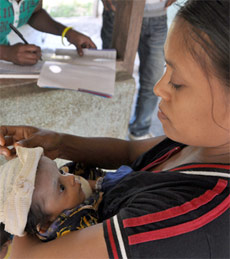fitness news
![]() ,
,![]()
Font size Women’s Health
Timor-Leste: Women slow to adopt safer birth practices.
– Reported, May 24, 2013
 Babies are plentiful in Timor Leste – almost seven per woman on average – and so too are health problems in a country where chronic malnutrition is rampant and access to effective healthcare remains a luxury.
Babies are plentiful in Timor Leste – almost seven per woman on average – and so too are health problems in a country where chronic malnutrition is rampant and access to effective healthcare remains a luxury.
That is why dozens of mothers from communities throughout the sub-district of Hatolia have travelled to the village of Asulao Sare, some walking more than an hour, for a check-up for themselves and their children from a visiting doctor. High birth rates, combined with the health and nutritional problems associated with severe poverty, make birth a dangerous affair for mother and child.
One example is a 41-year-old mother of eight, whose newborn has an imperforate anus (the passage is closed) and appears to have Down’s syndrome.
“The health workers told me before that it was dangerous to my health to have many children and that it would be difficult to feed all of them, but I didn’t agree.” Now, after her latest birth, she has accepted contraception.
Studies have long shown birth spacing – the practice of regulating the intervals between pregnancies – significantly reduces maternal and infant health risks.
Women line up for a check-up in Asulao Sare Among Timorese children, nearly half are underweight and more than half are stunted, according to government statistics. The risk of such problems is reduced dramatically when mothers have at least two years to recover between pregnancies, say health experts. Acknowledging that culture, habit, and logistical concerns, such as financial and transport limitations, prevent many rural families from seeking professional help, groups such as Frontline and Clinica Café Timor are training community members to serve as midwives.
The government has set goals for further improvements. The Strategic Development Plan 2011 – 2030, drafted by the Prime Minister’s office, stipulates that by 2015 about two-thirds of pregnant women will receive regular pre-natal check-ups and give birth with the assistance of a government-trained health worker. Health workers support this goal but believe meeting it will likely take longer.
In the meantime, the slowly growing body of community midwives is promoting pragmatic changes with limited means.
CREDITS.
For more Timor-Leste News Click Here